10 Reasons to Celebrate Soybean Month
August 6, 2024
By Haley Banwart
In late summer, Iowa's soybean fields are a sight to behold. Rows of lush soybean plants stretch endlessly across the landscape, creating a seamless, quilt-like pattern of greenery.
Soybean Month is celebrated in August — the peak of the growing season, when soybean fields are dotted with small, white or pale purple flowers, signaling that the plants are in full bloom. This is a perfect time to highlight the importance of soybeans, while they are most visible.
Here are 10 reasons to celebrate Soybean Month in Iowa before harvest season.
1. Leading Soybean Producer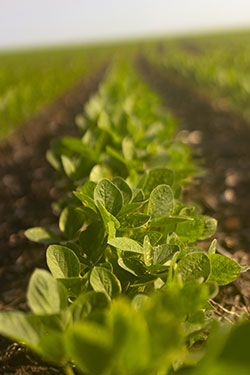
Iowa consistently ranks as one of the top soybean-producing states in the U.S. In 2023, Iowa farmers harvested 10 million acres of soybeans, producing 573 million bushels, which accounts for nearly 14% of the U.S. total. This impressive output places Iowa second nationally in soybean production.
The success of Iowa's soybean industry can be attributed to its fertile soil, favorable climate and dedicated farmers. Remarkably, 97% of Iowa's soybean farms are family-owned, with an average farm size of 346 acres.
2. Economic Powerhouse
Driven by the efforts of nearly 37,000 Iowa soybean farmers, the economic impact of soybeans extends across various sectors including food, manufacturing and fuel. The soybean industry supports thousands of jobs in agriculture, transportation, processing and other related industries.
While the value of Iowa’s soybean crop routinely exceeds $4.5 billion annually, it soared to $7.4 billion in 2023. Revenue from soybean exports further highlights Iowa’s contribution to the global soybean market.
3. Global Impact 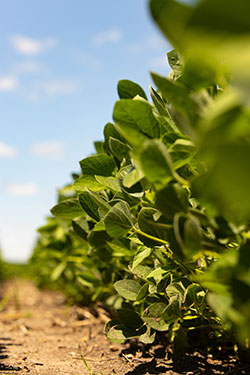
Iowa-grown soybeans reach markets worldwide, including China, Mexico, the European Union, Japan and the Philippines. Exports are transported in two main forms: whole soybeans and soybean meal, a high-protein byproduct, primarily used as animal feed.
“In the 2022-2023 marketing year, U.S. soybean meal exports broke records for both volume and value, reaching 13.2 million metric tons and $6.9 billion,” says Grant Kimberley, executive director of the Iowa Biodiesel Board and senior director of market development for the Iowa Soybean Association. “This increase in demand demonstrates the important role Iowa farmers play in ensuring global food security and economic stability.”
4. Nutritional Benefits
Soybeans offer a range of health benefits that make them a valuable addition to any diet. Rich in high-quality protein, they provide essential amino acids and are a good source of fiber, vitamins and minerals such as calcium, magnesium and iron. Their low saturated fat content and presence of unsaturated fats contribute to their status as a heart-healthy choice.
Soybean derivatives, like soy protein and soy milk, have become popular dietary staples. For creative cooks looking to up their grilling game, miso — a fermented paste made primarily from soybeans — offers a fantastic way to add savory flavor and a boost of protein to meals. Find three easy recipes here.
5. Supporting the Livestock Industry 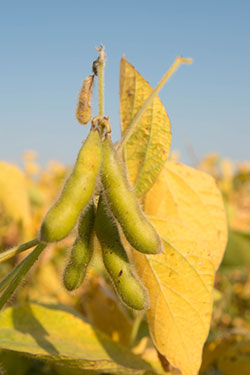
Soybean meal is a primary source of protein for livestock, supporting Iowa's robust animal agriculture sector. In fact, animal agriculture is the soybean industry's largest customer, with more than 90% of U.S. soybeans used for animal feed.
Thanks to its soybeans, Iowa continues to lead the nation in hog and egg production. The state produces around 25.2 million hogs and 13.4 billion eggs annually. One out of every five rows of soybeans grown in Iowa feeds these pigs, while 45 million layer hens consume more than 415,000 tons of soybean meal annually.
6. Renewable Energy Solutions
Soybeans are critical in biodiesel production, a renewable energy source that helps reduce reliance on fossil fuels and lower greenhouse gas emissions. Iowa is the top biodiesel producer in the U.S., generating around 350 million gallons annually.
This commitment to biodiesel showcases how soybeans are paving the way for a greener future while solidifying Iowa's position as a key player in renewable energy solutions.
7. Versatile Uses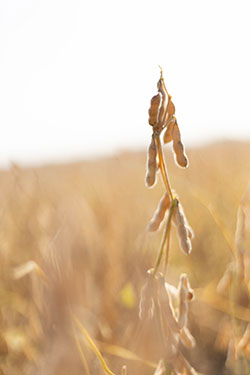
Soybeans are incredibly versatile, with applications across a wide range of industries. For example, in the manufacturing business, soybeans are used to produce biodegradable plastics, adhesives and even personal care products.
In the construction and automotive industries, soybeans have other surprising uses in soy asphalt and tire production, reducing reliance on petroleum and synthetics. This shift to soy-based materials provides eco-friendly alternatives to traditional petrochemicals, benefiting both the environment and consumers.
8. Research and Innovation
Iowa is home to leading institutions like Iowa State University (ISU), where cutting-edge research in soybean genetics, pest management and crop resilience is underway. The Iowa Soybean Research Center (ISRC) supports this progress through a decade of successful partnerships among researchers, farmers and industry experts. Together, they tackle challenges and explore innovative opportunities.
Dr. Greg Tylka, ISU department of plant pathology, entomology, and microbiology professor and ISRC co-director, says sustainable aviation fuel is emerging as an area of focus. “The industry is already investing in processing facilities to meet future biofuel demand,” he says. “To support a projected 30% increase in soy oil production, more crushing plants are needed, which requires growing more soybeans. With limited land available, boosting efficiency in soybean farming will be essential.”
9. Sustainable Farming Practices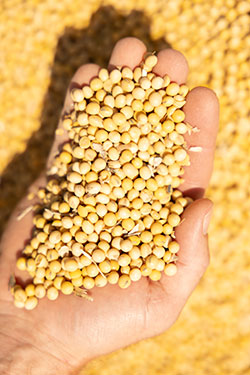
Research also contributes to ensuring the sustainability of future crops. Iowa's soybean farmers are at the forefront of implementing sustainable agricultural practices. Crop rotation, no-till farming and precision agriculture help maintain soil health, reduce erosion and minimize the environmental footprint of soybean production.
Iowa has made significant strides in sustainability over the past decade. The state has expanded its cover crop use to more than 2 million acres. Additionally, practices such as saturated buffers, bioreactors and wetland restoration are being used to enhance water quality and support environmental stewardship in soybean farming.
10. Community and Education
Soybean Month in Iowa serves as a valuable time to raise awareness about the crucial role of agriculture in our daily lives. Community events, farm tours and educational programs highlight the journey of soybeans from the fields to our homes, helping us gain a deeper appreciation for the dedication of Iowa farmers.
Events like the Iowa State Fair and ISRC SoyFest at ISU provide unique opportunities to engage with the soybean story. These celebrations offer insights into the connections we might overlook while driving past soybean fields, emphasizing the impact of this seemingly ordinary crop.